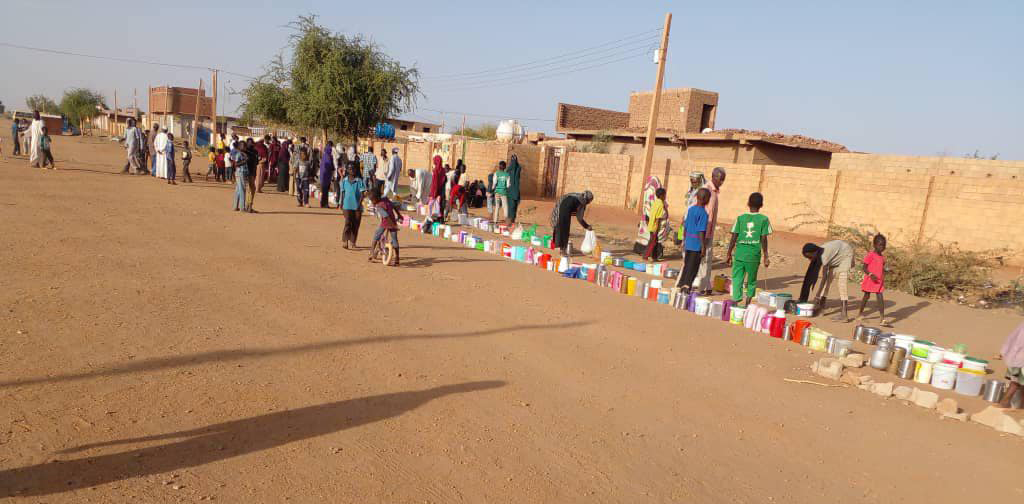
Escalating Malnutrition Cases in Darfur and Kordofan Amid Ongoing Conflict
Mashaer Idris
Children in the conflict-ridden regions of Darfur and Kordofan in Sudan are facing a severe malnutrition crisis amidst prolonged conflicts. The intensifying conflict has exacerbated the situation, with each passing day witnessing increased suffering due to the lack of medical services and acute shortages of food and medicine resulting from the war raging in these areas.
According to the latest analysis from the Integrated Food Security Phase Classification (IPC), an estimated 1.4 million children under the age of five are suffering from malnutrition, with 265,000 experiencing acute malnutrition.
UN agencies and local health authorities have reported alarming rates of malnutrition in hospitals and health centers, with up to 35% of children admitted to hospitals due to malnutrition facing critical conditions.
Fatima Ahmed, a resident of the Abu Shouk camp in North Darfur state, expressed concern about her malnourished child due to the lack of food. Fatima fears losing her children due to hunger and occasional conflicts in the state, which suffers from a severe shortage of food supplies.
The government has been urged to deliver humanitarian aid to Darfur to prevent deaths from hunger and poverty.
In this regard, Anders Thomsen, the UNICEF humanitarian coordinator in Sudan, stated that the situation is dire. "Children are dying from malnutrition because they cannot access the food, clean water, and healthcare they need," he said. Millions have fled their homes and cannot access basic services, exacerbating the situation. Humanitarian organizations are attempting to provide urgent assistance, but the security situation does not permit it.
A medical source working in war-displaced persons shelters in Babanusa city in West Kordofan state, western Sudan, revealed an increase in child mortality rates since the outbreak of war in the state. According to the medical source, child deaths in the camps have reached 75 since January 24 due to fevers, colds, food shortages, and the lack of healthcare.
The source also confirmed an increase in maternal deaths due to the lack of medical follow-up, as well as deaths among the elderly due to chronic diseases. The displacement rate in the state has reached 100%, compounded by worsening health conditions due to the closure of hospitals and health centers since the outbreak of war in the region.
Similarly, Majib al-Rahman Muhammad al-Zubair, the head of the civilian authority in areas controlled by the Sudan Liberation Movement, revealed an increase in malnutrition rates among children and the elderly in areas under the movements control in Darfur.
He stated that more than 75,000 children suffer from malnutrition in camps located within areas controlled by the movement. The movement led by Abdul Wahid Nur is stationed in Mount Marra, a rugged area spanning several states in the Darfur region. These camps include Tawila, Katur, Fanga, Surtoni, Diba Naira, Katrum, Galol, Turuntoura, Kaloktenj, Poverty Soap, and Vina. Al-Zubair confirmed an increase in the number of child deaths in the camps due to malnutrition, ranging from 10 to 15 deaths per month in each camp due to hunger, urging UN organizations, regional, and international organizations to intervene urgently and save the humanitarian situation from turning into a catastrophic situation that is difficult to control.
Additionally, a spokeswoman for the World Food Program announced that the UN will resume humanitarian aid operations to Darfur states through the borders of Chad and South Sudan within two weeks.
Sudanese authorities announced, in the first week of March, the initiation of arrangements to prepare border crossings and airports to receive humanitarian aid.
Lenny Kansley told Sudan Tribune, "The entry of aid to Darfur states will begin at the end of March after the opening of the borders between the two countries." She added, "The operation will be conducted in coordination between the two parties to the conflict as stipulated in the Juba Agreement, in addition to coordination with the armed struggle movements."
Kansley also announced that the UN aims to reach one million people monthly in Darfur with aid and acknowledged challenges facing the humanitarian aid transportation process, including the approaching autumn season and the impact of rain on roads, as well as the increased activity of non-signatory armed movements in the Mount Marra area. She confirmed the presence of relief supplies currently in Chad.
Twenty-five million Sudanese people are in need of humanitarian assistance, with nearly 18 million suffering from food insecurity, as the prolonged conflict between the Sudanese army and Rapid Support Forces since mid-April last year has destroyed the countrys livelihoods and industrial base.

